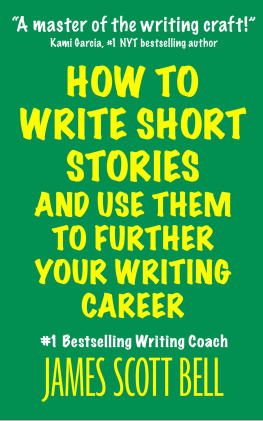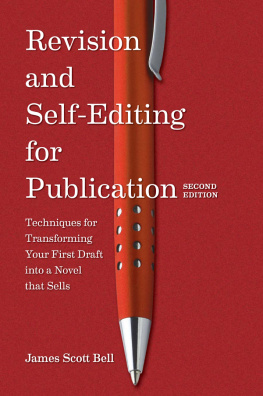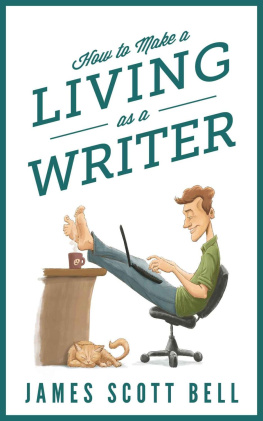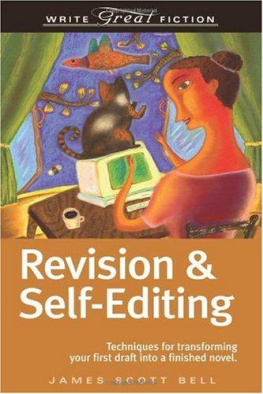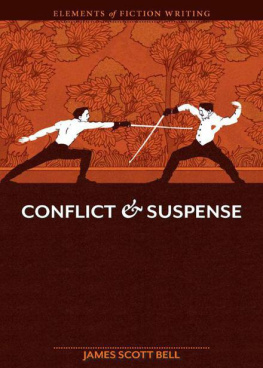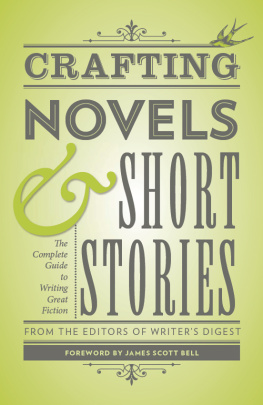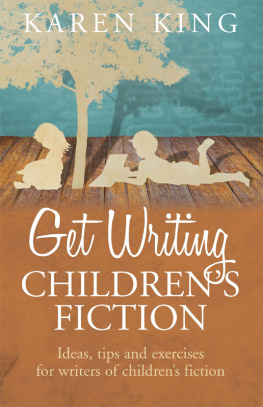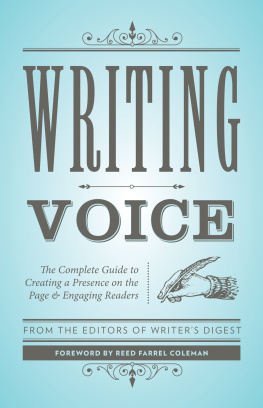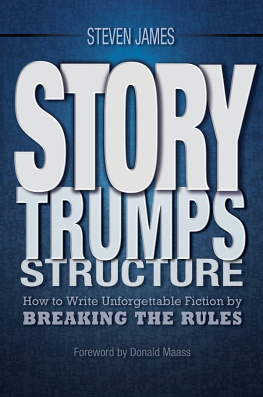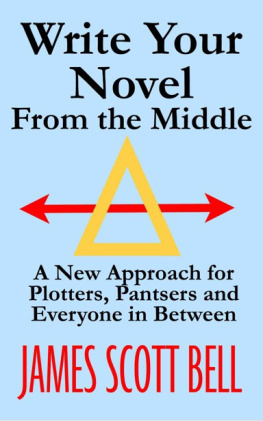Contents
Guide
Just Write
Creating Unforgettable Fiction and a Rewarding Writing Life
James Scott Bell
WritersDigest.com
Cincinnati, Ohio
JUST WRITE. Copyright 2016 by James Scott Bell. All rights reserved. No part of this book may be reproduced in any form or by any electronic or mechanical means including information storage and retrieval systems without permission in writing from the publisher, except by a reviewer, who may quote brief passages in a review. Published by Writers Digest Books, an imprint of F+W Media, Inc., 10151 Carver Road, Suite # 200, Blue Ash, OH 45242. (800) 289-0963. First edition.
For more resources for writers, visit www.writersdigest.com .
Distributed in Canada by Fraser Direct
100 Armstrong Avenue
Georgetown, Ontario, Canada L7G 5S4
Tel: (905) 877-4411
Distributed in the U.K. and Europe by F&W Media International
Brunel House, Newton Abbot, Devon, TQ12 4PU, England
Tel: (+44) 1626-323200, Fax: (+44) 1626-323319
E-mail:
Distributed in Australia by Capricorn Link
P.O. Box 704, Windsor, NSW 2756 Australia
Tel: (02) 4577-3555, Fax: (02)4577-5288
E-mail:
ISBN-13: 978-1-59963-970-3
Acknowledgments
I would like to thank Phil Sexton and Rachel Randall of F+W Media for the idea for this book, and Cris Freese and Kimberly Catanzarite for helping me whip it into shape.
Also, a big shout out to my blog mates at Kill Zone ( www.killzoneblog.com ) and the many thoughtful commenters who make it one of the finest writing craft sites on the Internet.
Most of all, to my wife, Cindy, who demonstrates true love by reading all my work in its early stages, and stays calm.
About the Author
JAMES SCOTT BELL is the author of the number one bestseller for writers, Plot & Structure, and numerous thrillers, including, Romeos Rules, Try Dying, and Dont Leave Me. In addition to his traditional novels, Jim has self-published in a variety of forms. His novella One More Lie was the first self-published work to be nominated for an International Thriller Writers Award. He served as the fiction columnist for Writers Digest magazine and has written highly popular craft books, including: Write Your Novel From the Middle, Super Structure, The Art of War for Writers, and Conflict & Suspense.
Jim has taught writing at Pepperdine University and at numerous writers conferences in the United States, Canada, Great Britain, Australia, and New Zealand. He attended the University of California, Santa Barbara, where he studied writing with Raymond Carver, and graduated with honors from the University of Southern California Law Center.
Visit his website, www.JamesScottBell.com .
Introduction
Embrace the Flux
In one episode of Downton Abbey, when it became clear that the old ways of life were on the way out, never to return, Carson the butler mused, The nature of life is not permanence, but flux.
Right on, Carson. That was true for you, and its true for us. Especially when it comes to the world of writing.
Because even as I type these words, even as I turn this manuscript in to my wonderful editor at Writers Digest Books, there is no question that the publishing landscape will be different once this book is available to readers.
Because change is the new normal.
It was never like this in the old days (like, before 2007).
The book industry went about things in pretty much the same way for three hundred years. Large companies were in control of the production of paper books. The only way to get a book into wide circulation was to have it published by one of these companies. Writers who hoped to make a living at their craft had only one place to go, and usually that was an outfit in New York.
Along the way, an insatiable reading habit formed among the evermore-educated populace. To serve that habit, magazines printed on cheap pulp paper became a huge business. Cheap but substantial stories and novellas were made possible by such pulps as Dime Detective, Black Mask, Weird Tales, and Fight Stories.
And still the writer was beholden to those who controlled the printing presses and distribution channels.
Oh, sure, along the way, a few enterprising authors decided they might like to try doing all this themselves. It may have started with a New England poet by the name of Walt Whitman. He paid for the initial printing of his volume of poems, Leaves of Grass. To help spur sales, Whitman even wrote some glowing reviews of the book under an assumed name (thus inventing the sock puppet).
Mark Twain was another enterprising self-publisher. He even started his own company and took on other authors books. The company went bust in 1894.
For the most part, those who paid for the publication of their own books were destined to have a garage full of ... their own books.
Bookstores, you see, dealt primarily with the big publishers. The owners of the bookstores wanted to sell a lot of books. So they ordered most of their stock from those publishers who had signed popular authors.
In the 1980s and 1990s, New York publishers opened the bank vaults in a big way for authors they thought would provide hit books. Somelike John Grisham, James Patterson, David Baldacci, and Danielle Steeledelivered home runs time after time.
But there were even more writers who received those huge advances and saw their books tank, which in turn ruined their careers. No other publisher would sign them because they were marked damaged goods. A few managed to find homes with smaller publishers. Others faded from the scene altogether.
Harsh.
It was also monstrously difficult for a new author to break into traditional publishing, a land I have sometimes called the Forbidden City. First, they needed an agent to get them access. Then they were subject to a publishers committee meeting, where one sour note from the marketing department could scotch a books publication.
At the turn of our century, the publishing landscape was littered with the scattered manuscripts and bodies of writers who never made it past the gatekeepers.
And it seemed that things would ever be thus.
Until the year 2007.
What happened in 2007?
Helen Mirren took home an Academy Award for her performance in The Queen.
The San Antonio Spurs swept the Cleveland Cavaliers to win the NBA championship.
Drew Carey replaced Bob Barker on The Price Is Right.
And a company by the name of Amazon introduced a little product they called the Kindle.
Changing the Game Forever
The publishing industrys initial reaction to the Kindle was a yawn. Several years before, the market for electronic books had floundered even though Sony was behind it. Surely, thought the New York publishing industry, no one outside of a handful of techno-nerds was going to go for electronic. Real books were printed! They had covers and dust jackets! Print books would remain the preferred reading experience until the Apocalypse!
But the following year a few enterprising writers began to notice something. Amazon was allowing writers to publish digital books directly. These books were sold through the Amazon online store. A writer did not have to wait, worry, or pay for printing.
And some of these books took off. Writers no one had ever heard of were selling tens of thousands of books.


